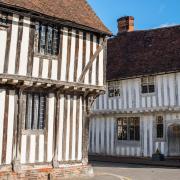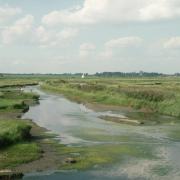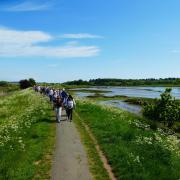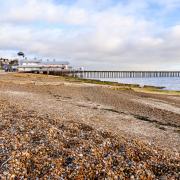Celebrated film director and Suffolk resident Paul Greengrass was in Woodbridge for a special screening of his latest work and to meet his audience. Nick Cottam went along

Anyone can make a film these days. All you need is a smart phone and a rudimentary understanding of social media.
This was one of the encouraging messages from high profile film director Paul Greengrass recently when he spoke to a full house audience at the Riverside Cinema, Woodbridge.
The man who has made his mark with films like Bloody Sunday (2002) and two of the Bourne series, Bourne Supremacy in 2004 and The Bourne Ultimatum in 2007, was at the cinema as part of the its centenary celebrations, introducing another nail biting Greengrass thriller, Captain Phillips and taking part in a lengthy Q&A session.
The British film industry was in fine fettle, said Greengrass as part of an upbeat message, and there has never been a better time for would-be film makers to give it a go.
“With innovations like the British Film Institute and Channel 4 there’s tremendous support for young film makers,” he said. The caveat for anyone contemplating making the jump from smart phone cameo to the big screen is that around 80% of the films made in the UK are from first time film makers, who then don’t go on to make a follow-up. The film director’s version of first album or first novel syndrome needs protagonists to find their long-term voice and be confident they have a point of view worth airing.
Cambridge University-educated Greengrass, who has a house in Walberswick, found his own voice over a 10-year period in the 1980s working for the edgy ITV current affairs programme World in Action, before moving on to made-for-television non fiction drama, and then to the big screen. His big break came when he directed the highly acclaimed Bloody Sunday, which dealt with the shooting of Irish activists by British soldiers in 1972 and won first prize at the 2002 Berlin Film Festival.
“The thing about film,” he says “is it’s an industrial process (even in a digital age) and I just love the process. The paradox of film making is that you have to make sense of this entirely unruly medium. It’s about learning from the floor up and understanding how films actually get made.”
Those of us sitting through the extreme tension of Captain Phillips at the Riverside had little doubt that Greengrass has mastered his craft. The trademark hand held camera techniques and docu-drama style that Greengrass has made his own were to the fore in the film’s stand off between Captain Phillips (played by Tom Hanks) and his crew and four Somali pirates attempting to hi-jack a monstrously large Maersk container ship.
No, said the director in the post screening Q&A, he hadn’t met the real life Captain Phillips until after filming, and yes, everyone involved in making the film had spent many hours and days filming in an actual life raft – the wave-tossed centre of action for much of the second half of the film. No simulated filming for this particular sea-sick crew.
With a father who now lives at Felixstowe and spent a lifetime at sea, this was a film close to Greengrass’ heart, not to mention his interest in topical, often politically ambiguous subject matter.
“I wanted to make a film about my dad’s world,” he has said, and Greengrass senior returned the compliment by joining his son for the Riverside screening.
Whether portraying Somali pirates or Irish activists, Greengrass films appear to provide a left leaning insight into political power and some of the fall out from our topsy turvy global economy. That said, a film like Bloody Sunday didn’t demonise anybody, he says.
“My role is to try and find stories which provide an audience with insight into the world as I see it. It’s a bit like making music – you know what your range is and you find the material to suit that range.
“One of the loveliest things about this job is that your working life becomes a conversation with yourself. Each film leads to the next project and you start to see a thread.”
Thus alongside the secret agent drama of the Bourne series – itself a more contemporary version of James Bond – we also have United 93 about the 9/11 hijacking of the fourth plane, United Airlines Flight 93, and Green Zone about the unsuccessful hunt for weapons of mass destruction in Iraq. Power and where it lies is never far from the Greengrass centre of gravity. With another Bourne film in the pipeline and a film version of the superb Robert Harris thriller The Fear Index we can look forward to more of the same – reality drama which seeks to provide a different perspective on the fast moving world of current affairs.
In fact, Greengrass reminisced with his Riverside Cinema audience, love of film, not to mention the beginnings of a social conscience go right back to his early childhood.
“I have an intensely vivid memory of being taken to see Dr Zhivago when I was very young. I absolutely remember seeing the Cossacks attack the marchers, which encrypted on my mind in some way that this was the way the world was.”



























